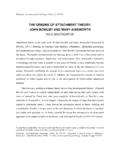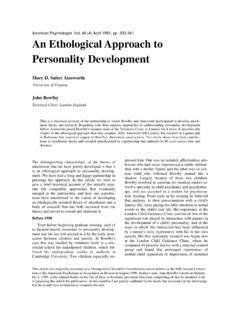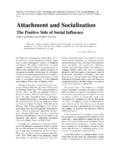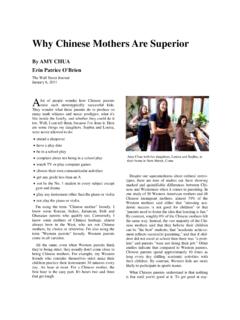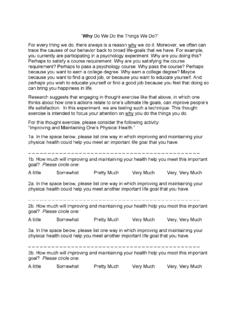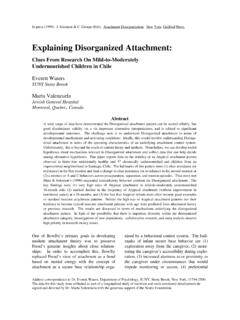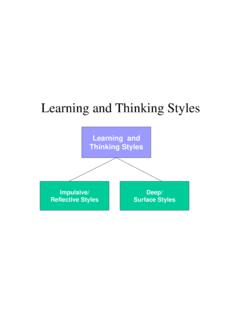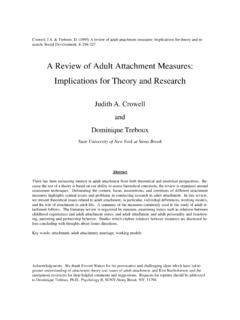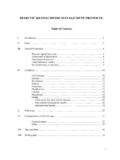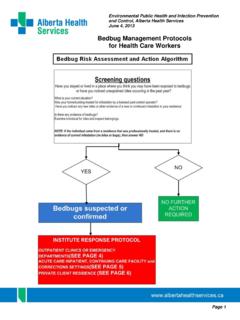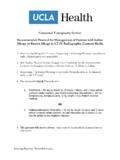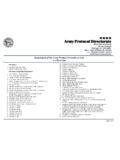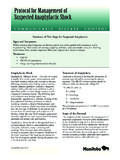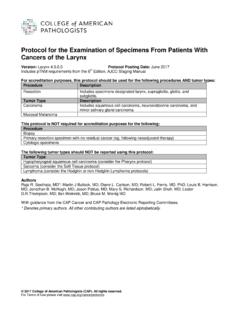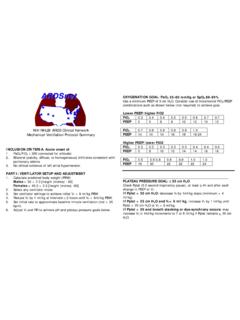Transcription of ADULT ATTACHMENT INTERVIEW PROTOCOL - …
1 This material is not a substitute for training in AAI administration procedure. It is provided because it is important for consumers of AAI research to have easy access to the INTERVIEW questions. Without them, it is difficult to evaluate published research. Seeing the full INTERVIEW PROTOCOL can also help consumers of AAI based research appreciate the level of inter-view information and detail underlying AAI scores. It can also help them make important decisions about the adequacy of procedures in various reports they may encounter.
2 The authors of the AAI make the scoring manual available only in conjunction with their training courses. Researchers interested in understanding more about the logic of scoring the AAI can however see the scoring manual for Crowell & Owens Current Relationship INTERVIEW (CRI) which is available in full on this site. The logic and procedures for scoring the CRI closely parallel those for the AAI. The primary difference is that the AAI focuses on relationships to parents and the CRI on relationships to ADULT ATTACHMENT figures.
3 At present this is the only detailed source of insights into the criteria for scoring the AAI available to those who do not take the training course. Do not reproduce this material without permission of the author. EW ADULT ATTACHMENT INTERVIEW PROTOCOL George, C., Kaplan, N., & Main, M. (1985). The ADULT ATTACHMENT INTERVIEW . Unpublished manuscript, University of California at Berkeley. (Note: This document is for illustration only. Contact the authors for information about training and the most current version of the INTERVIEW PROTOCOL .)
4 Introduction I m going to be interviewing you about your childhood experiences, and how those experiences may have af-fected your ADULT personality. So, I'd like to ask you about your early relationship with your family, and what you think about the way it might have affected you. We'll focus mainly on your childhood, but later we'll get on to your adolescence and then to what's going on right now. This INTERVIEW often takes about an hour, but it could be anywhere between 45 minutes and an hour and a half.
5 1. Could you start by helping me get oriented to your early family situation, and where you lived and so on? If you could tell me where you were born, whether you moved around much, what your family did at various times for a living? This question is used for orientation to the family constellation, and for warm-up purposes. The research par-ticipant must not be allowed to begin discussing the quality of relationships here, so the "atmosphere" set by the interviewer is that a brief list of "who, when" is being sought, and no more than two or three minutes at most should be used for this question.
6 The atmosphere is one of briefly collecting demographics. In the case of participants raised by several persons, and not necessarily raised by the biological or adoptive parents (frequent in high-risk samples), the opening question above may be "Who would you say raised you?': The interviewer will use this to help determine who should be considered the primary ATTACHMENT figure (s) on whom the INTERVIEW will focus. Did you see much of your grandparents when you were little? If participant indicates that grandparents died during his or her own lifetime, ask the participant's age at the time of each loss.
7 If there were grandparents whom she or he never met, ask whether this (these) grandparents) had died before she was born. If yes, continue as follows: Your mother's father died before you were born? How old was she at the time, do you know? In a casual and spontaneous way, inviting only a very brief reply, the interviewer then asks, Did she tell you much about this grandfather? Did you have brothers and sisters living in the house, or anybody besides your parents? Are they liv-2 ing nearby now or do they live elsewhere?
8 - 2. I'd like you to try to describe your relationship with your parents as a young child if you could start from as far back as you can remember? Encourage participants to try to begin by remembering very early. Many say they cannot remember early child-hood, but you should shape the questions such that they focus at first around age five or earlier, and gently re-mind the research participant from time to time that if possible, you would like her to think back to this age pe-riod.
9 Admittedly, this is leaping right into it, and the participant may stumble. If necessary, indicate in some way that experiencing some difficulty in initially attempting to respond to this question is natural, but indicate by some silence that you would nonetheless like the participant to attempt a general description. 3. Now I'd like to ask you to choose five adjectives or words that reflect your relationship with your mother starting from as far back as you can remember in early childhood--as early as you can go, but say, age 5 to 12 is fine.
10 I know this may take a bit of time, so go ahead and think for a I'd like to ask you why you chose them. I'll write each one down as you give them to me. Not all participants will be able to think of five adjectives right away. Be sure to make the word relationship clear enough to be heard in this sentence. Some participants do use "relationship" adjectives to describe the par-ent, but some just describe the parent herself , "pretty".. "efficient manager"--as though they had only been asked to "pick adjectives to describe your mother".
